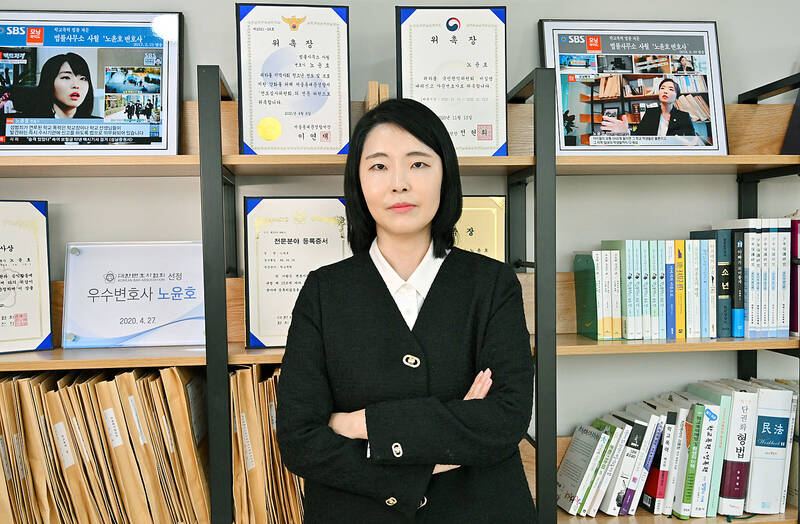Pins hidden in her shoes, head forced down a toilet, kicked in the stomach: South Korean hairdresser Pyo Ye-rim suffered a litany of abuse from school bullies, but now she is speaking out.
The 26-year-old is part of a phenomenon sweeping South Korea known as “Hakpok #MeToo,” where people who were bullied publicly name and shame the perpetrators of school violence — “hakpok” in Korean — decades after the alleged crimes.
Made famous globally by Netflix’s gory revenge series The Glory, the movement has ensnared everyone from K-pop stars to baseball players and accusations — often anonymous — can be career-ending, with widespread public sympathy for victims.

Photo: AFP
As a schoolgirl, Pyo said she suffered alone. Teachers told her “to be friendlier” to her bullies and the abuse went unchecked for years, eventually forcing her to give up her dreams of higher education and quit school for vocational training.
“There was only one thing I wished for. I wished someone could help me,” she said, adding that no one came to her aid and eventually she “escaped and struggled to survive on my own.”
In education-obsessed South Korea, where children can spend up to 16 hours per day studying at schools and in private academies, bullying is widespread, experts say, despite official efforts to stamp it out.

Photo: AFP
Advocates say the problem is that bullying often goes unpunished in real-time at schools, and the statute of limitations on such crimes makes it hard for victims to bring charges years later.
Pyo said she suffered from years of insomnia and depression as a result of her treatment at school, before deciding to stop hiding and go public with her accusations — resulting in one of her bullies being fired from their job.
Pyo is lobbying for real legal change, demanding that South Korea suspend the statute of limitations affecting school violence and change the defamation law to better protect victims.
The Glory — which follows a woman’s meticulously planned revenge scheme after suffering years of brutal abuse from high school bullies — helped amplify South Korea’s national discussion about bullying. In an ironic sign of how pervasive the issue is, after the show became a hit, the director, Ahn Gil-ho, was himself accused of teenage bullying and forced to apologize.
Even South Korea’s presidential office was recently forced to withdraw a top police appointment after it emerged the candidate’s son had bullied classmates, sparking public backlash.
School violence is endemic in South Korean schools, said Noh Yoon-ho, a Seoul-based attorney who specializes in bullying cases, adding that it is a “collective trauma” the country needs to process.
“Any South Korean who has gone to school has been a victim or witnessed other students being bullied and not helped — we all have memories of this,” Noh said.
The “Hakpok #MeToo” movement has helped many victims shed the shame of their experience, and realize they were not bullied “because they were lacking something,” she added.
The problem is that there is still no system in place at the school level where victims can “approach without hesitation for an immediate and adequate response when incidents occur,” said Kim Ji-hoon, a criminology professor who has researched bullying in South Korea.
Pyo and other victims say that South Korea should remove the statute of limitations on school violence so bullies can be held accountable even decades later.
However, there are huge practical issues with legally punishing adults for crimes committed as a juvenile, which could give people lasting criminal records for teenage misdeeds, Noh said.
Pyo is also calling for an overhaul of South Korea’s criminal defamation laws, which allow bullies to sue their accusers for damages and win — even if their victims are telling the truth.
Most accusations are anonymous, but have resulted in bullies being fired or, in the case of one of South Korea’s most successful baseball players, excluded from the national team.
Despite widespread public support for victims, some have questioned the fairness of such punishments. It would be far better to work with schools — where such crimes have typically been ignored — to ensure that bullying is addressed as it happens, experts say.
Unless this is done, the public naming and shaming will continue.
“It’s gotten this bad because no victims have done it before now,” Pyo said, adding that unless the defamation law changes, bullies can still threaten victims with lawsuits.
“This is why no one is able to talk,” except anonymously, she said. “If this law disappears, countless victims will start speaking out.”

Kehinde Sanni spends his days smoothing out dents and repainting scratched bumpers in a modest autobody shop in Lagos. He has never left Nigeria, yet he speaks glowingly of Burkina Faso military leader Ibrahim Traore. “Nigeria needs someone like Ibrahim Traore of Burkina Faso. He is doing well for his country,” Sanni said. His admiration is shaped by a steady stream of viral videos, memes and social media posts — many misleading or outright false — portraying Traore as a fearless reformer who defied Western powers and reclaimed his country’s dignity. The Burkinabe strongman swept into power following a coup in September 2022

‘FRAGMENTING’: British politics have for a long time been dominated by the Labor Party and the Tories, but polls suggest that Reform now poses a significant challenge Hard-right upstarts Reform UK snatched a parliamentary seat from British Prime Minister Keir Starmer’s Labor Party yesterday in local elections that dealt a blow to the UK’s two establishment parties. Reform, led by anti-immigrant firebrand Nigel Farage, won the by-election in Runcorn and Helsby in northwest England by just six votes, as it picked up gains in other localities, including one mayoralty. The group’s strong showing continues momentum it built up at last year’s general election and appears to confirm a trend that the UK is entering an era of multi-party politics. “For the movement, for the party it’s a very, very big

ENTERTAINMENT: Rio officials have a history of organizing massive concerts on Copacabana Beach, with Madonna’s show drawing about 1.6 million fans last year Lady Gaga on Saturday night gave a free concert in front of 2 million fans who poured onto Copacabana Beach in Rio de Janeiro for the biggest show of her career. “Tonight, we’re making history... Thank you for making history with me,” Lady Gaga told a screaming crowd. The Mother Monster, as she is known, started the show at about 10:10pm local time with her 2011 song Bloody Mary. Cries of joy rose from the tightly packed fans who sang and danced shoulder-to-shoulder on the vast stretch of sand. Concert organizers said 2.1 million people attended the show. Lady Gaga

SUPPORT: The Australian prime minister promised to back Kyiv against Russia’s invasion, saying: ‘That’s my government’s position. It was yesterday. It still is’ Left-leaning Australian Prime Minister Anthony Albanese yesterday basked in his landslide election win, promising a “disciplined, orderly” government to confront cost-of-living pain and tariff turmoil. People clapped as the 62-year-old and his fiancee, Jodie Haydon, who visited his old inner Sydney haunt, Cafe Italia, surrounded by a crowd of jostling photographers and journalists. Albanese’s Labor Party is on course to win at least 83 seats in the 150-member parliament, partial results showed. Opposition leader Peter Dutton’s conservative Liberal-National coalition had just 38 seats, and other parties 12. Another 17 seats were still in doubt. “We will be a disciplined, orderly